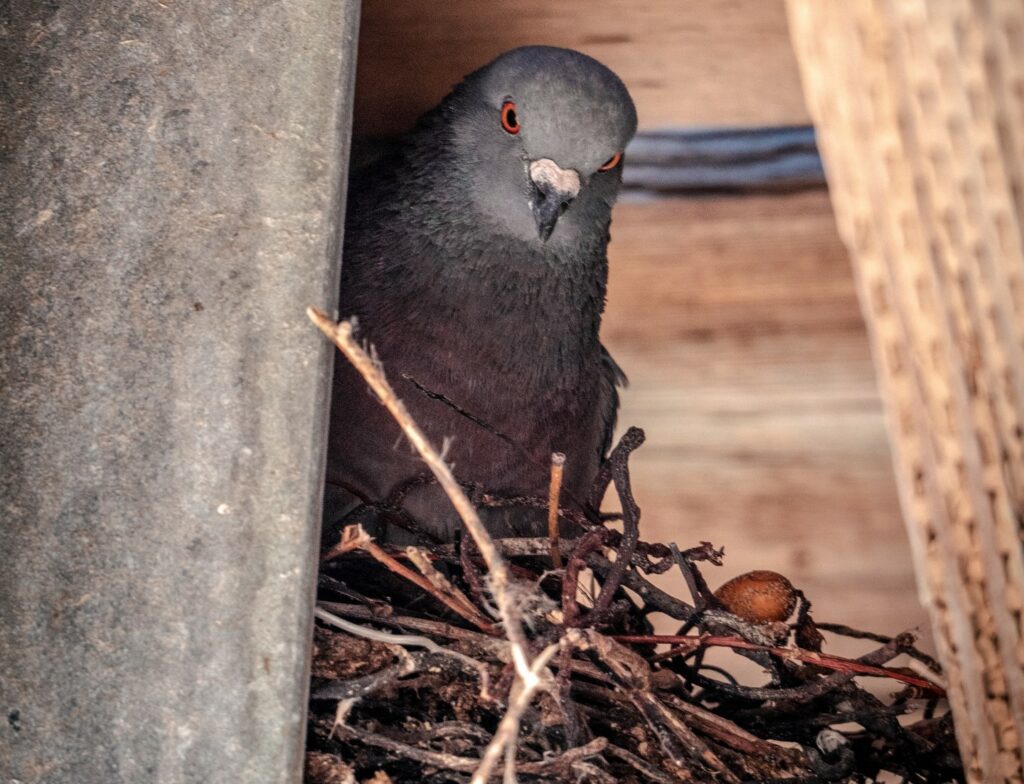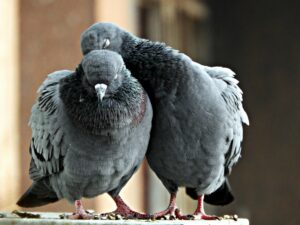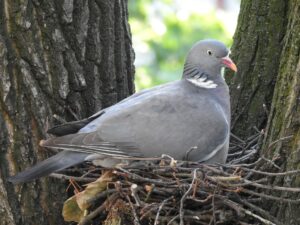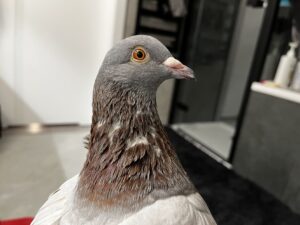Pigeons have been revered and valued in various cultures around the world for centuries. They are known for their strong homing instincts and have been used for messenger services, racing, and even as symbols of peace.
In addition to their cultural significance, pigeons also play important roles in the ecosystem as seed dispersers and pollinators.
One aspect of pigeon biology that may be of interest to many people is their egg-laying habits. Pigeons, like many other birds, reproduce by laying eggs. Female pigeons lay eggs, while male pigeons fertilize them.
In this article, I will focus on answering the question of how many eggs a pigeon lays. I will examine the reproductive cycle of pigeons, the average number of eggs laid by different pigeon species and breeds, and the factors that can affect a pigeon’s egg-laying abilities.
JUMP TO:

10-second summary of how many eggs pigeons lay
On average, a pigeon lays two eggs per clutch, with a minimum of one egg and a maximum of three eggs.
However, the number of eggs laid by a pigeon can vary depending on factors such as the pigeon’s age, diet, and environmental conditions. Some pigeon species and breeds may lay more or fewer eggs than others.
Check this out: How Often Do Pigeons Lay Eggs?
Pigeon reproduction and egg-laying habits
In this section, we will examine the range of eggs laid by different pigeon species and breeds and the average number of eggs laid by a pigeon per clutch.
By understanding the egg-laying habits of pigeons, you can gain insights into their reproductive biology and better understand the factors that can affect their ability to reproduce.
The reproductive cycle of pigeons: courtship, nesting, and egg-laying
Pigeon reproduction involves a series of stages, including courtship, nesting, and egg-laying.

- During courtship, male pigeons, also known as cocks or drakes, will often perform elaborate courtship rituals to attract a female pigeon, also known as a hen. Once a pair of pigeons has bonded, they will begin the process of building a nest.
- Pigeon nests can vary in size and complexity depending on the species and habitat, but they are typically made of twigs, grass, and other materials and are built in a safe and sheltered location.
- Once the nest is complete, the female pigeon will begin to lay eggs. Pigeon eggs are typically white or off-white in color and are slightly smaller than chicken eggs.
Read this: 30 Facts About Pigeons
Factors that can affect the number of eggs laid by a pigeon
The number of eggs a pigeon lays can vary depending on a number of factors, including the pigeon’s age and overall reproductive health.
- A mature male pigeon will typically have more success in reproducing than a younger one, and a healthy diet can help to ensure that a pigeon is in good condition for reproduction.
- Environmental conditions, such as weather and predators, can also impact a pigeon’s ability to reproduce and lay eggs.
Overall, the reproductive cycle of pigeons involves a series of stages and can be influenced by a variety of factors that I will discuss in more detail in the further part of this article.
Check this: 11 Myths About Pigeons
The average number of eggs pigeons lay
The number of eggs laid by a pigeon can vary depending on the species and breed.

However, the following is usually the most common:
- Some pigeon species are known to lay more eggs, while others may lay only one egg or two eggs per clutch.
- In general, however, the average number of eggs laid by a pigeon is one or two per clutch.
- It’s not uncommon for pigeons to lay a third egg, especially if the first two eggs are lost or damaged. This is known as a “replacement egg.” The female pigeon will typically lay the replacement egg a few days after the first two eggs, and all three eggs will be incubated and cared for as a single clutch.
Check this: Why Don’t We See Baby Pigeons?
When do pigeon eggs hatch?
Okay, but what happens when a female pigeon lays eggs in its pigeon’s nest? How do you know when eggs will hatch?

- Pigeon eggs hatch after about 17 to 19 days of incubation period in the pigeon nest.
- Both male and female pigeons take turns incubating the eggs and caring for the young pigeons, or squabs, once they hatch.
- Pigeons are known for their strong parenting instincts and will fiercely defend their nest and baby pigeons.
Check this: Are Pigeons Smart?
Are all pigeon eggs fertile? Not all the eggs are!
Not all pigeon eggs are necessarily fertile.
- Fertilization of a pigeon egg occurs when a male pigeon’s sperm fertilizes the egg during copulation. If fertilization does not occur, the egg will not develop into a hatchling.
- Pigeons are known to have a high rate of fertility, and it is not uncommon for a pair of pigeons to produce multiple clutches of eggs in a single breeding season.
However, there are a number of factors that can affect the fertility of pigeon eggs, including the age and overall health of the pigeons, their diet, and environmental conditions.
It’s also worth noting that pigeon eggs can be damaged or lost during the incubation process, which can reduce the overall fertility rate of a clutch.
Pigeons may lay replacement eggs if the first eggs are lost or damaged, but these eggs may also be infertile.
What are dummy eggs?
Artificial eggs for pigeons, also known as dummy eggs or decoy eggs, are a tool used by pigeon breeders and researchers to control the egg-laying habits of pigeons. These eggs are typically made of plastic or other materials and are used to replace real eggs in the nest.

The use of artificial eggs can be helpful in a variety of situations, including when a pigeon is laying too many eggs, when eggs are being lost or damaged, or when it is necessary to control the timing of egg-laying. Artificial eggs can also be used as a training tool to help young pigeons learn to incubate and care for eggs.
It’s worth noting that while artificial eggs can be a useful tool for pigeon breeders and researchers, they should be used with caution and care. It’s important to follow the manufacturer’s instructions and to use artificial eggs in a way that does not cause harm to the pigeons.
Factors that can affect the number of eggs laid by a pigeon
There are a number of factors that can affect the number of eggs a pigeon lays. These include:
- Young age: Pigeons reach sexual maturity at different ages depending on the species and breed. Younger pigeons may not be fully mature and may have a lower fertility rate or may not lay eggs at all. As pigeons age, they may become more fertile and may lay more eggs.
- Diet: A pigeon’s diet can play a role in their reproductive health and egg-laying ability. Pigeons need a balanced diet that includes a variety of nutrients, such as protein, fat, and carbohydrates, to maintain good reproductive health. A pigeon that is not getting enough of these nutrients may have a lower fertility rate or may lay fewer eggs.
- Environmental conditions: Factors in the environment, such as weather and predators, can impact a pigeon’s ability to reproduce. Pigeons may not lay eggs or may lay fewer eggs if they are stressed or threatened by predators. Extreme weather conditions, such as extreme heat or cold, can also affect a pigeon’s reproductive cycle and egg-laying abilities.
In addition to these factors, it’s worth noting that pigeon parents also have a unique way of feeding their young: they produce a substance called “crop milk,” which is produced in the lining of the crop (a part of the digestive system) and fed to the squabs (baby pigeons) through regurgitation.
The production of crop milk uses energy and nutrients, so it may also affect a pigeon’s ability to lay eggs.
Check this: How To Tell If A Pigeon Is Male Or Female?
Frequently asked questions about pigeon eggs
Here are some often-asked questions about pigeon eggs.
How big are pigeon eggs?
Pigeon eggs are typically smaller than chicken eggs, with an average size of about 1.5 inches in length and 1.25 inches in width.
What color are pigeon eggs?
Pigeons usually lay white eggs. Pigeon eggs are usually white or off-white in color.
How long do pigeon eggs take to hatch?
Pigeon eggs typically hatch after about 17 to 19 days of incubation.
Do both male and female pigeons care for the eggs?
Both male and female pigeons take turns incubating the eggs and caring for the young pigeons, or squabs, once they hatch.
Can pigeon eggs be eaten?
Pigeon eggs can be eaten and are considered a delicacy in some cultures. They are smaller and have a softer shell than chicken eggs, and are often boiled or fried.
How many eggs does a pigeon lay in a year?
The number of eggs a pigeon lays in a year can vary depending on the species, breed, and individual pigeon. Some pigeon species and breeds may lay more eggs per year than others.
Can pigeon eggs be incubated and hatched by humans?
It is possible for humans to incubate and hatch pigeon eggs, although it requires careful attention to temperature and humidity levels and may not always be successful.
Can pigeon eggs be used for cooking?
Pigeon eggs can be used in cooking in a similar way to chicken eggs. They are typically smaller and have a softer shell, so they may need to be handled with care.
What is the nutritional value of pigeon eggs?
Pigeon eggs are a good source of protein, vitamins, and minerals, and are similar in nutritional value to chicken eggs.
Can pigeon eggs be used in recipes like chicken eggs?
Pigeon eggs can be used in recipes that call for chicken eggs, although they are typically smaller and may have a slightly different taste. It may be necessary to adjust the amount of eggs used in a recipe to account for the size difference.
Final thoughts
In conclusion, pigeon reproduction involves a series of stages, including courtship, nesting, and egg-laying.
The number of eggs a pigeon lays can vary depending on a number of factors, including the pigeon’s age, diet, and environmental conditions.
On average, a pigeon lays one or two eggs per clutch, although some species and breeds may lay more or fewer eggs.
Understanding the egg-laying habits of pigeons is important for pigeon breeders and researchers, as well as those who are simply interested in these fascinating birds.
By learning more about the factors that can affect a pigeon’s ability to reproduce and the average number of eggs laid per clutch, we can gain insights into pigeon reproduction and the biology of these interesting birds.
It’s worth noting that while we have covered some of the key factors that can affect a pigeon’s egg-laying abilities, there is still much more to learn about pigeon reproduction and egg-laying habits.




